Serving 239 students in grades Prekindergarten-5, Fayetteville Street Elementary School ranks in the bottom 50% of all schools in North Carolina for overall test scores (math proficiency is bottom 50%, and reading proficiency is bottom 50%).
The percentage of students achieving proficiency in math is 30-34% (which is lower than the North Carolina state average of 51%). The percentage of students achieving proficiency in reading/language arts is 20-24% (which is lower than the North Carolina state average of 50%).
The student:teacher ratio of 12:1 is lower than the North Carolina state level of 15:1.
Minority enrollment is 96% of the student body (majority Hispanic), which is higher than the North Carolina state average of 57% (majority Black and Hispanic).
Quick Stats (2025)
- Grades: Prekindergarten-5
- Enrollment: 239 students
- Student:Teacher Ratio: 12:1
- Minority Enrollment: 96%
- Overall Testing Rank: Bottom 50% in NC
- Math Proficiency: 30-34% (Btm 50%)
- Reading Proficiency: 20-24% (Btm 50%)
- Science Proficiency: 50-59% (Btm 50%)
- Source: National Center for Education Statistics (NCES), NC Dept. of Education
Top Rankings
Fayetteville Street Elementary School ranks among the top 20% of public schools in North Carolina for:
Category
Attribute
Percent Eligible For Free Lunch
Community Size
Student Attention
School Overview
Fayetteville Street Elementary School's student population of 239 students has declined by 15% over five school years.
The teacher population of 20 teachers has grown by 5% over five school years.
Grades Offered
Grades Prekindergarten-5
Total Students
239 students
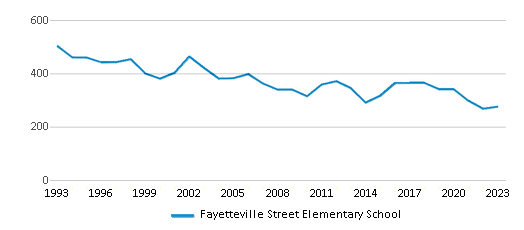
Gender %
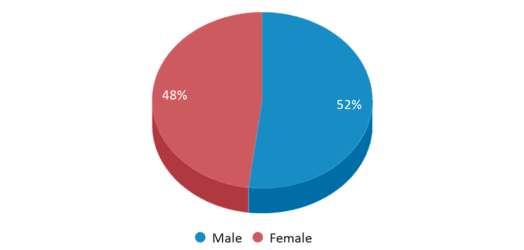
Total Classroom Teachers
20 teachers
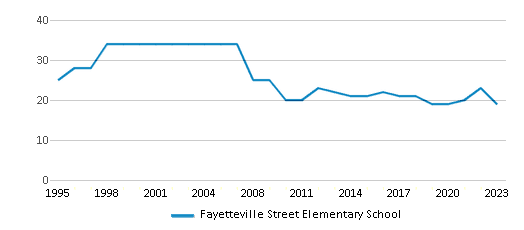
Students by Grade
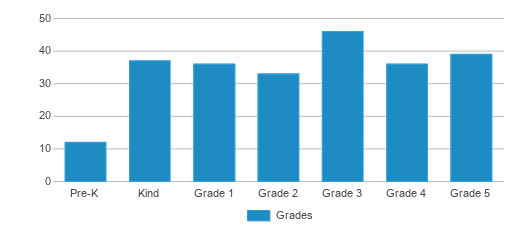
School Rankings
Fayetteville Street Elementary School ranks within the bottom 50% of all 2,617 schools in North Carolina (based off of combined math and reading proficiency testing data).
The diversity score of Fayetteville Street Elementary School is 0.62, which is less than the diversity score at state average of 0.71. The school's diversity has stayed relatively flat over five school years.
Overall Testing Rank
#2338 out of 2617 schools
(Bottom 50%)
(Bottom 50%)
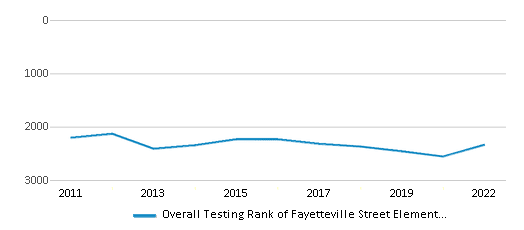
Math Test Scores (% Proficient)
30-34%
51%
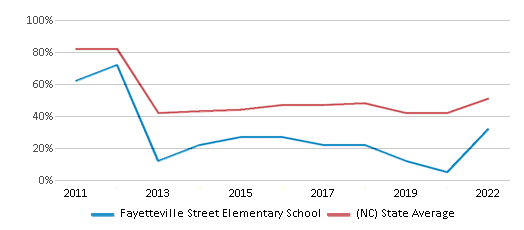
Reading/Language Arts Test Scores (% Proficient)
20-24%
50%
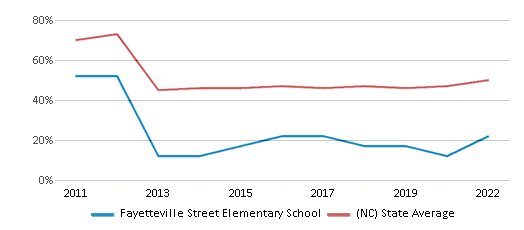
Science Test Scores (% Proficient)
50-59%
63%
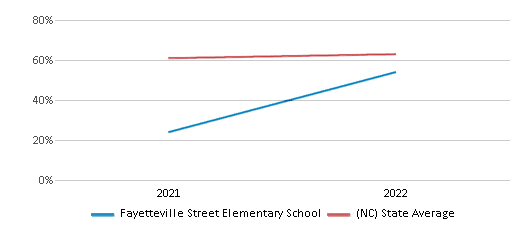
Student : Teacher Ratio
12:1
15:1
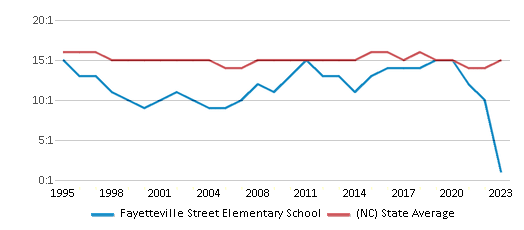
American Indian
n/a
1%
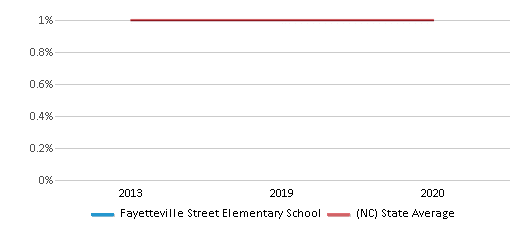
Asian
4%
4%
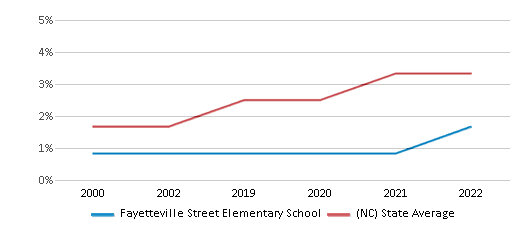
Hispanic
48%
21%
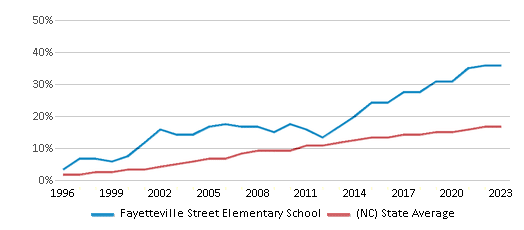
Black
39%
25%
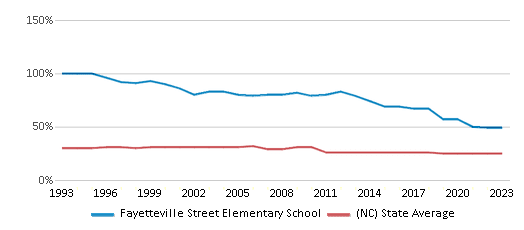
White
4%
43%
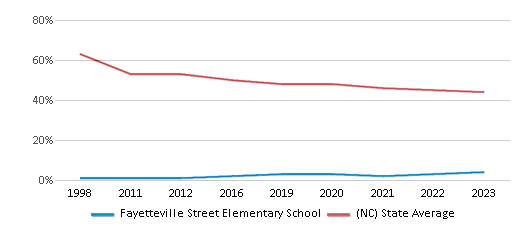
Hawaiian
n/a
n/a
Two or more races
5%
6%
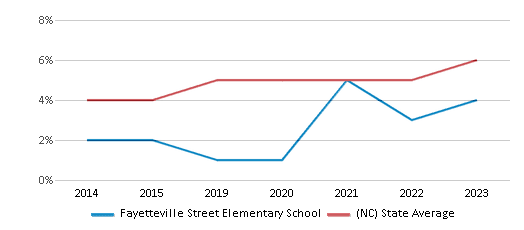
All Ethnic Groups
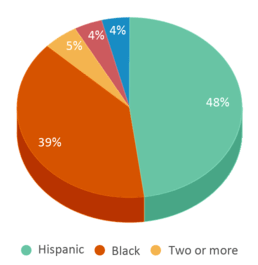
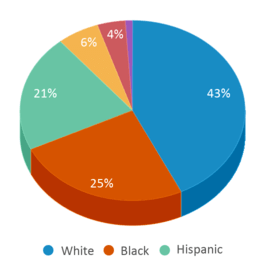
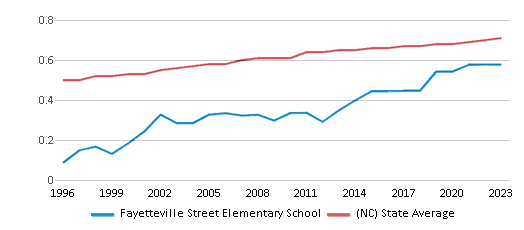
Participates in the National School Lunch Program (NSLP)
Yes
Eligible for Free Lunch
98%
68%
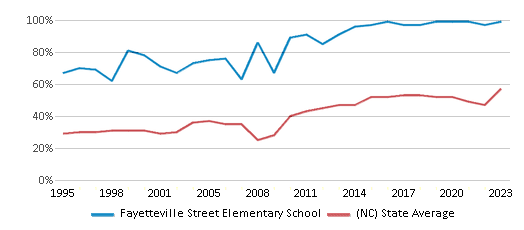
Eligible for Reduced Lunch (13-14)
3%
7%
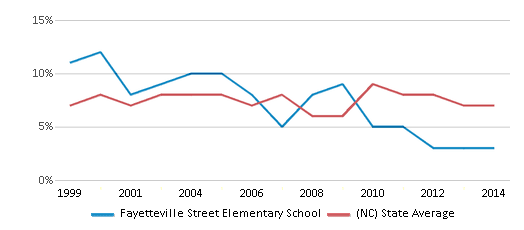
School Statewide Testing
School District Name
Source: National Center for Education Statistics (NCES), NC Dept. of Education
Profile last updated: 02/09/2025
Frequently Asked Questions
What is Fayetteville Street Elementary School's ranking?
Fayetteville Street Elementary School is ranked #2338 out of 2,617 schools, which ranks it among the bottom 50% of public schools in North Carolina.
What schools are Fayetteville Street Elementary School often compared to?
Fayetteville Street Elementary Schoolis often viewed alongside schools like C C Spaulding Elementary School, Eno Valley Elementary School, Glenn Elementary School by visitors of our site.
What percent of students have achieved state testing proficiency in math and reading?
30-34% of students have achieved math proficiency (compared to the 51% NC state average), while 20-24% of students have achieved reading proficiency (compared to the 50% NC state average).
How many students attend Fayetteville Street Elementary School?
239 students attend Fayetteville Street Elementary School.
What is the racial composition of the student body?
48% of Fayetteville Street Elementary School students are Hispanic, 39% of students are Black, 5% of students are Two or more races, 4% of students are Asian, and 4% of students are White.
What is the student:teacher ratio of Fayetteville Street Elementary School?
Fayetteville Street Elementary School has a student ration of 12:1, which is lower than the North Carolina state average of 15:1.
What grades does Fayetteville Street Elementary School offer ?
Fayetteville Street Elementary School offers enrollment in grades Prekindergarten-5
What school district is Fayetteville Street Elementary School part of?
Fayetteville Street Elementary School is part of Durham School District.
School Reviews
5 9/26/2007
Fayetteville St School has a wonderful staff that cares about the students. They are there to make sure our children who eventually become their children make it. Letting each one of them know that they can accomplish anything they put their minds to do. They are somebody. I enjoyed my grandson coming to this wonderful school. The spirit that is there must have spoiled over from when I was there, because they teachers wanted us to know that each one of us they were proud of.
5 2/14/2007
Fayetteville Street is one of the smallest school's in Durham with one of the biggest and caring staff. The staff are very knowledgeable about curriculum and helping students to succeed. They often go beyond what is required. Parents are encouraged to be apart of the decision making team as well as a part of the classroom.
Review Fayetteville Street Elementary School. Reviews should be a few sentences in length. Please include any comments on:
- Quality of academic programs, teachers, and facilities
- Availability of music, art, sports and other extracurricular activities
Recent Articles

What Is A Charter School?
Explore the world of charter schools in this comprehensive guide. Learn about their history, how they operate, and the pros and cons of this educational innovation. Discover key facts about charter schools, including admission policies, demographics, and funding, as well as what to look for when considering a charter school for your child.

10 Reasons Why High School Sports Benefit Students
Discover the 10 compelling reasons why high school sports are beneficial for students. This comprehensive article explores how athletics enhance academic performance, foster personal growth, and develop crucial life skills. From improved fitness and time management to leadership development and community representation, learn why participating in high school sports can be a game-changer for students' overall success and well-being.

February 05, 2025
Understanding the U.S. Department of Education: Structure, Impact, and EvolutionWe explore how the Department of Education shapes American education, from its cabinet-level leadership to its impact on millions of students, written for general audiences seeking clarity on this vital institution.







